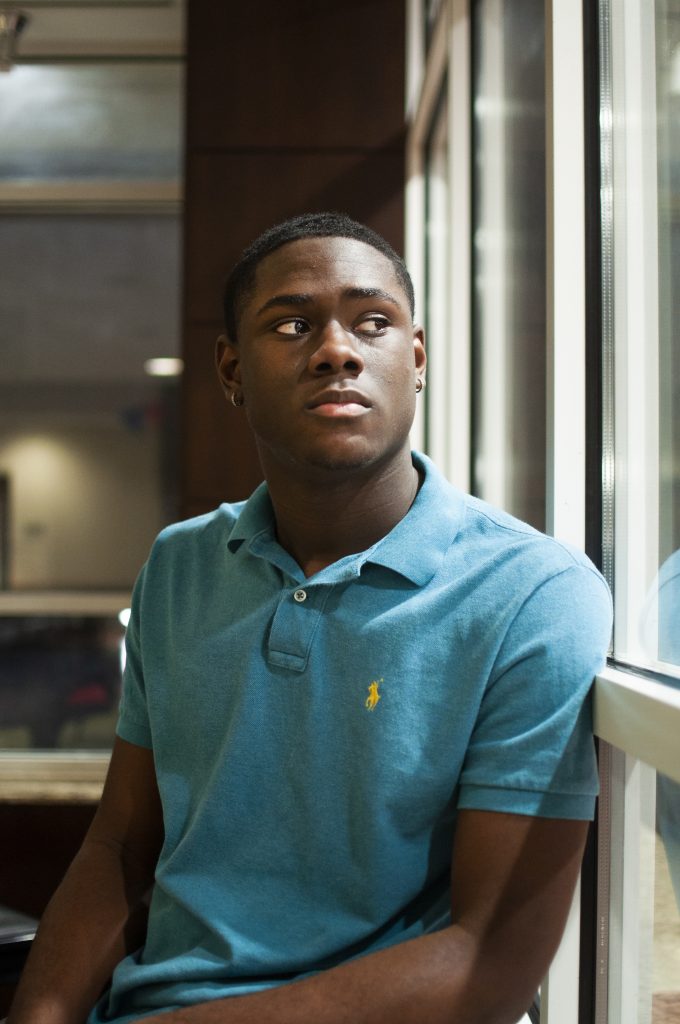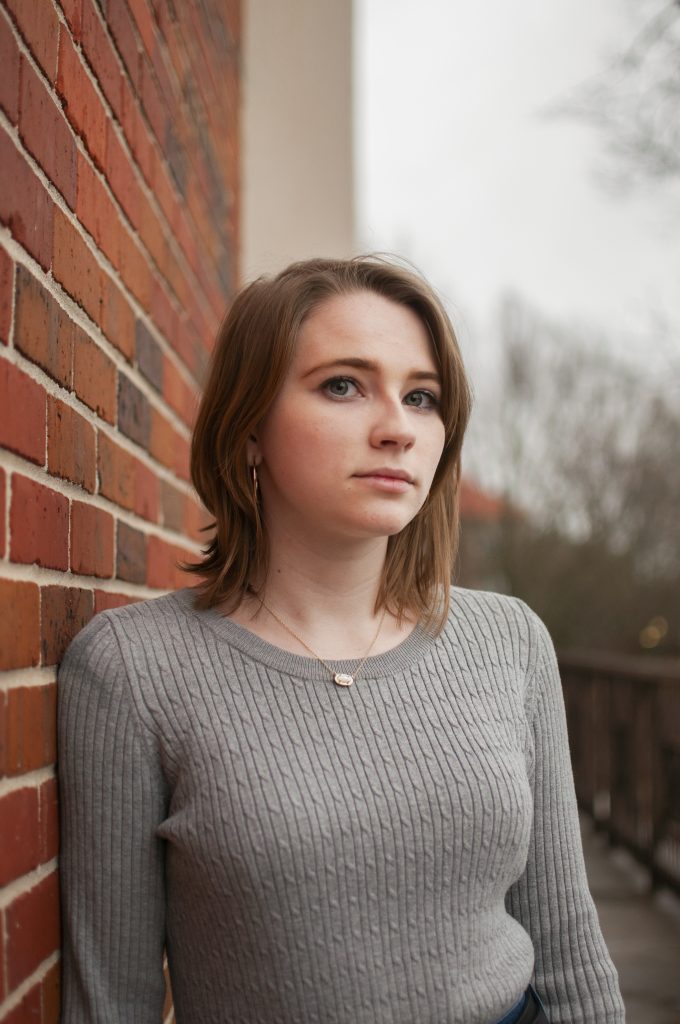Today, Marcus Williams and one of his friends will get in his Honda and drive five hours to his home in Pascagoula.
It’s something his parents insisted on. He won’t be back until Monday, when campus is expected to be a little calmer. As Confederate groups storm campus this weekend, Williams will be at home, 331 miles away.
Williams’s parents heard about the protests through social media before he did, and he said they emphasized his returning home was “not up for discussion.”
“No questions asked,” he said. “I need to go home. I don’t feel safe here.”

Freshman Marcus Williams’s parents didn’t give him a choice in the matter about coming home, but he agreed that he needed to leave Oxford for the weekend because of the protests. “No questions asked,” he said. (Photo by Devna Bose)
Though the freshman computer engineering major and his family had heard negative things about the University of Mississippi before he enrolled, Williams decided to come anyway.
When Williams first heard about this weekend’s protests, he wasn’t surprised, but he was scared. Of Williams’s friend group, all of them are going back home except one from North Carolina, but he will be travelling south with Williams.
In an email sent out to university students on Monday, University Police Department Chief Ray Hawkins encouraged everyone to stay away from campus this weekend.
“The best thing you can do to help keep our campus safe is to stay away from this area of campus on Saturday, Feb. 23,” he said, referring to Grove Loop and University Avenue.
Williams believes if the university had taken extra precautions, the weekend would go more smoothly, especially for students.
The Black Student Union sent out a draft email to members on Thursday night to provide to professors if they feel uncomfortable going to class today. BSU president Jarvis Benson encouraged members to reach out to him if they need anything over the weekend.
Benson said the organization chose to send the email after Confederate 901 member Billy Sessions went “live” in a video through Facebook on Thursday night.
On Thursday night, UPD addressed “social media activity that has heightened anxiety related to the march scheduled for Friday afternoon at 3 p.m.,” referring to Students Against Social Injustice’s “Students Over Statues” protest.
“Related security measures have been taken, and safety remains our first priority,” the statement read.
Though sociology professor James Thomas said he hadn’t received any emails from students asking to leave town, he said he would have excused them.
“We’ve already received word that this campus is not safe to be on this weekend, so I think if students are able to go home they should and should not be punished for doing so,” Thomas said.
Williams thinks that the university should have canceled classes on Friday to make it easier for students who feel unsafe to go home. One of his teachers, Le’Trice Danyell Donaldson, canceled Williams’s African American studies class on Friday. She said, “I know some of your families want you to go home,” and assigned the class a one-page paper to complete over the weekend.
Freshman psychology major Alyssa Whitehead won’t be making the entire drive to her hometown of Petal, but she does plan on getting out of Oxford today until Sunday.
When she first heard of the protest via Facebook, Whitehead thought it was “one of those fake things that gets circulated,” until she realized it was actually happening.
“I got a very vague message (from the university), and it didn’t really detail what was happening,” she said. “We get similar emails every day, so we wouldn’t know it was an emergency and something we need to be concerned about. I was very shaken up.”

Freshman Alyssa Whitehead is leaving Oxford on Friday because of the protests happening this weekend. Though she agrees with the right to bear arms, she doesn’t think anyone should be allowed to have a weapon on campus. (Photo by Devna Bose)
Whitehead decided eventually to go to her boyfriend’s hometown of Flowood for the weekend.
“My goal was just to get away,” she said. “Hearing about it and knowing this group has a history. … No matter what precautions are taken, something can happen.”
Whitehead described her parents as “very conservative people and pro-gun,” but the idea of the protest still scared them because “they know how people can get.”
“They wanted me to get off campus and stay in my dorm and not be out at all,” she said. “I had to tell them that I have to go near the Circle and the Grove. It’s something that I can’t avoid without missing class.”
None of Whitehead’s professors have canceled classes on Friday.
Though she realizes she will probably have to walk near the protests on Friday, Whitehead has her friends of color in mind.
“I’m not going to be targeted. I have friends who are people of color, and I know that if they have to go near this, they’re in so much more danger than I am,” she said. “It’s caused me to think more deeply about their safety. Especially this month, it has been consuming a lot of my attention, and rightfully so.”
She knew the history of Oxford and Ole Miss before attending and expected a similar situation to occur during her time here, but she didn’t expect a “full protest.” Regardless, the content of the protest didn’t surprise her “at all.” Whitehead sees the Confederate statue often, and she’s found herself considering the university and its history more deeply over the course of the past few months.
“Even though it’s ‘just a statue,’ the history and obvious connotations surrounding it shouldn’t be a part of this campus,” she said. “The statue itself does not represent what the university has been growing toward in the slightest.”
Similarly, when Williams goes to class and passes the Confederate monument in the Circle, he is reminded of what he fears — that he doesn’t belong here.
“(The statue) just reminds me of how I’m not welcome on campus. The other day, I was really deciding whether I should continue to go to Ole Miss. I feel like they don’t want black people here. We call this our home, but is it really our home?” he said. “I don’t know if I’ll come back next semester.”






